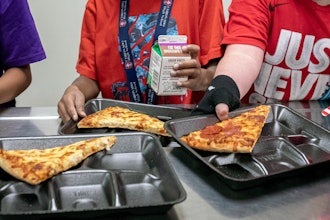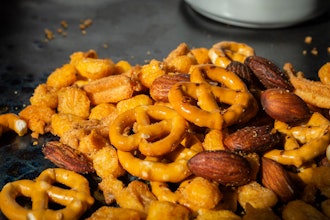HUTCHINSON, Kan. (AP) — U.S. Sen. Pat Roberts told Kansas agricultural leaders Saturday at the state fair that the food stamp program is the "redline" for Democrats in the passage of the farm bill — and that his is crop insurance.
The Republican senator said that the Senate will not pass a farm bill without what it sees as an "appropriate" funding for the Supplemental Nutrition Assistance Program, or SNAP.
While Democrats have opposed any cuts to the $80 billion-a-year food stamp program, designed to give people temporary food assistance when their income falls beneath a certain level, Republicans have proposed many different approaches to trimming it. The program has more than doubled in cost in the last five years as the economy faltered and now serves around 1 in 7 Americans.
"The farm bill is a perfect storm," Roberts told the Kansas Farm Bureau at their annual breakfast meeting in the Kansas State Fair.
Food stamps were added to the farm bill decades ago to gain urban votes for the rural measure, which sets policy for farm subsidies, programs to protect environmentally sensitive land and other rural development projects. But with the program's exponential growth during the recent economic downturn, food stamps are now making passage harder.
The Senate bill would cut the food stamp program, now known as the, by about $400 million a year, or half a percent, and Senate Democrats have been reluctant to cut more. The House bill stripped food stamps from the scaled-down bill it passed, saying they would deal with that issue in a separate bill.
During a farm forum later at the state fair, Roberts told the crowd that if the farm and food assistance programs are kept separate conservative rural lawmakers will have less control over the food stamp program.
"As long as we have the dog-gone thing, at least we have some control," Roberts said.
U.S. Sen. Jerry Moran said, like Roberts, his emphasis is on the crop insurance program.
Roberts said there will be no farm bill until the House deals with the food assistance program. He is part of the conference committee now trying to hammer out differences between the farm bill versions passed by the two chambers.
Despite the rhetoric at the state fair about the 'redline' on crop insurance, both the Senate and House versions of the farm bill keep the crop insurance.
Moran says the country's focus on Syria is delaying the farm bill debate. He said he wants to avoid another extension.
But Roberts said the conferees can meet despite the Syria debate and said he is optimistic something will be worked out on a farm bill.
Congress will have to finish a farm bill before the end of the year if lawmakers want to avert the threat of milk prices doubling for consumers. Most of current farm law expires at the end of September, but its effects won't be felt until the end of the year when dairy supports expire. Without the supports, milk prices are expected to rise.
The House version also included one new provision that repeals laws from the 1930s and 1940s that kick in when current farm law expires. Farm-state lawmakers have kept those laws on the books so there would be incentive to pass new farm bills, but the threat of outdated policies kicking in has been a headache for farmers who worry they can't depend on Congress to create new laws or extend more recent versions of the law.






















